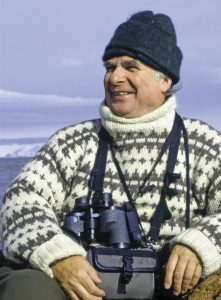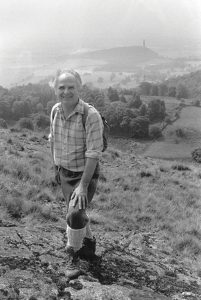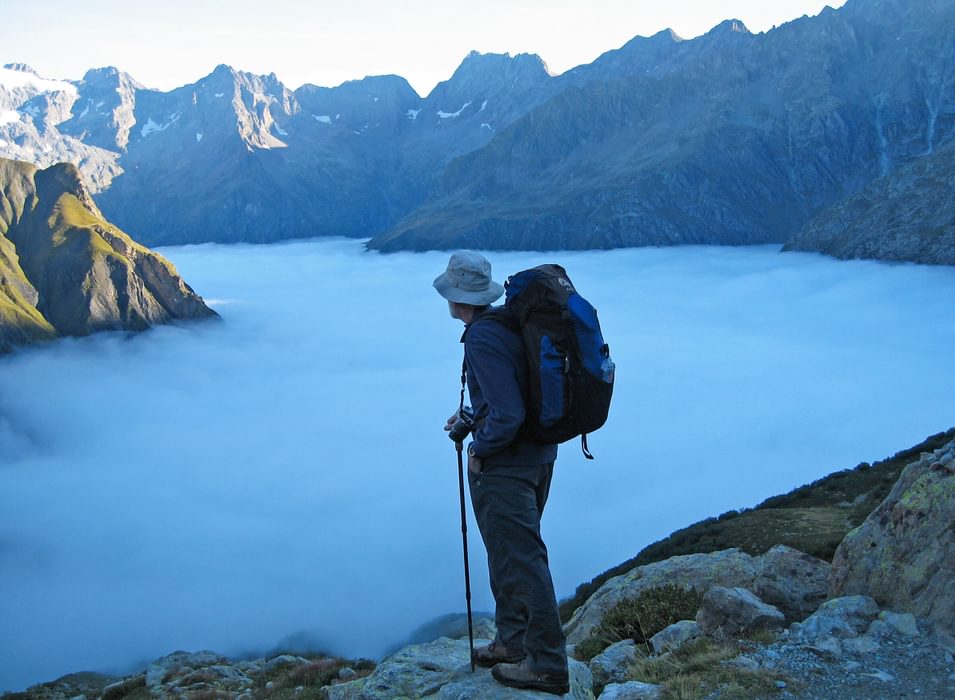Dr Rennie McOwan (1933-2018) – Champion of access to the Scottish hills
by Roly Smith – OWPG Vice-President
It’s a strange fact but my 25-year friendship with the distinguished Scottish access campaigner and writer Rennie McOwan, who has died aged 85, began with a heated argument conducted in an inflatable boat speeding up an icy fjord in Arctic Svarlbard.

As Rennie and Hamish Brown compared the surrounding, snow-clad peaks with the ones at home in the Scottish highlands, the discussion turned to National Parks for Scotland. As a former National Park employee and a long-time supporter of the idea, I found myself at odds with both Rennie and Hamish.
“There’s no need for another level of bureaucracy in Scotland,” insisted Rennie. “Anyway, the whole of Scotland is good enough to be a National Park and should be treated as one.”
But from that initial disagreement sprang a mutual respect and lasting friendship that I’ll always treasure. I never needed to mention the fact that Scotland eventually gained two National Parks (in the Cairngorms and Loch Lomond and the Trossachs), because Rennie was also a pragmatist whose undying love of the Scottish hills and their protection for future generations was ingrained in his very soul.
“In terms of campaigning for a freedom to roam and land reform, Rennie McOwan was a giant. On a personal note I have always been indebted to Rennie for so willingly and generously sharing his immense knowledge of Scottish mountaineering, history, folklore and culture. Rennie McOwan will be remembered as an excellent journalist, mountaineer, historian, environmental campaigner and a true son of Scotland.”
(Cameron McNeish, Ramblers Scotland’s vice-president)

It would be no exaggeration to say that Rennie McOwan was the Percy Unna of his generation, such was his campaigning zeal for the freedom of access to the Scottish hills. Percy Unna was a great wilderness campaigner and generous benefactor to the National Trust for Scotland in the 1930s, who famously set up a list of rules which Rennie, as a former Deputy Press Secretary with the NTS, always strenuously upheld.
The Unna Rules were intended to ensure that land which was held on behalf of the public should be preserved for their use in a primitive condition, without development or active management. Rennie fell out with the NTS over this principle, notably in Glencoe, scene of some of Unna’s greatest bequests, over the construction of the footbridge leading to Coire Gabhail (the “Lost Valley”), and a proposed visitor centre near the Clachaig Inn.
Rennie, like me, was a journalist by profession, starting as a cub reporter with the Stirling Journal before moving on to The Scotsman as a sub-editor and later Scottish Desk Editor at the age of 23. He regularly contributed to Scottish newspapers and magazines, notably The Scotsman, Scotland on Sunday, and the Scots Magazine. He was a founder member of The Scotsman Mountaineering Club, now the Ptarmigan Club, of Edinburgh.
“Rennie was a huge influence on me as we made the case in the 1990s for access legislation. It was of enormous importance that Rennie was so supportive, so firm and coherent in his writings and speeches and so knowledgeable on Scottish traditions and culture. He was so helpful in providing advice, encouragement and information on a regular basis. His passing is a big loss to Scotland, but he leaves us with an impeccable legacy.”
(Dave Morris, Former director of Ramblers Scotland)
He later became president of Ramblers Scotland, appropriately in the year that the Scottish Parliament passed what is widely regarded as some of the finest access legislation in the world with the Land Reform Act (Scotland), 2003. Rennie had played a key role in getting that legislation onto the Statute Book.
His old friend the late Irving Butterfield claimed that Rennie’s finest hour was when he was invited to address the Landowners’ Federation at the launch of the temporary Access Concordat in 1996, which preceded the 2003 legislation.
“Throughout his journeying Rennie fast developed a broader perspective of his native country and found it fascinating to compare the different cultural backgrounds, the varying uses of the land, the effects of clearances, and the traditions of free access. In these studies a search for the truths of the old Gaelic culture was to confirm in him his long-held belief of the freedom to roam.”
(the late Irving Butterfield, from an article written for Scottish Mountaineer)
One observer commented that Rennie had “read them the Riot Act” and his crucial address was described by the chair, Magnus Magnusson, as “statesman-like.”
Rennie was a prolific author of more than 15 mainly historical and children’s books, and his Light on Dumyat (1982), an adventure by a group of youngsters called The Clan and set on the 1,375ft western rampart of his native Ochils, was a particular favourite. One reviewer sagely commented that The Clan “could outwit the Famous Five any day of the week.”
In 1996, Rennie was awarded an honorary doctorate by Stirling University, where he lectured in film and media studies, for his contribution to Scottish literature and culture. He was awarded the Provost of Stirling’s Civic Award for Arts and Culture, and in 1992, was the founder of the Friends of the Ochils.
Rennie was one of the leading outdoor writers in Scotland in the Sixties… but for many years had been seriously ill and not able to follow his dreams of hills, travel, meeting people and above all, his writing. He was a doughty supporter of the Scottish landscape against the crass developments that appeared and he was interested in history and the natural world. We shared a great affection for the Ochils, hills we lived under at their east and west ends.
(Hamish Brown, long-time friend and colleague )
The late Walt Unsworth, president of the Guild, presented Rennie with the Guild’s coveted Golden Eagle award at our annual dinner at the Moat House Hotel in Harrogate in 1997. Always the proud Scot, Rennie turned up in a kilt in the McOwan tartan. Typically, in his acceptance speech, Rennie appealed for the Guild to set up a working group to look into the whole question of access to the countryside of Britain.
Rennie always took a keen interest in introducing young people to the hills and regularly visited schools and colleges as a lecturer under the Scottish Arts Council’s “Writers in Schools” and “Writers in Public” schemes.
Ironically, Rennie’s great grandfather Donald Ross was a legendary chief stalker on the Duke of Portland’s Caithness estate. Born in Hillfoots, Rennie had his first brush with the lairds and their stalkers as a member of the Menstrie Scouts. He later lived in Stirling with Agnes, his loving wife of nearly 60 years, in the shadow of his beloved Ochils, and was a long-suffering and life-long supporter of Stirling Albion FC.
In later years he suffered from Parkinson’s disease and his increasing ill health and poor vision robbed him of his greatest joy of striding the hills, especially his home ground of the Ochils.
The couple had four children: Lesley Andrews, who runs Rowan Tree Publishing, which has re-published Rennie’s children’s books; Michael, who lives with his family in Tasmania; Tom and Niall. The couple have five grandchildren.
Hillgoers throughout Scotland and beyond owe an enormous debt of gratitude to the kindly and generous Rennie McOwan, who fought so long and hard so that they could enjoy the freedom of the hills we have today.
Rest in peace, old chum.

